Hwadzan and the other Pure Land societies around the world have a vast network of volunteers working on various media production projects, including translation of traditional Chinese culture content. At around the same time I started working for Akasa, my friend Stefanie asked if I would help her and other volunteers translate a video lecture series about a book called The Governing Principles of Ancient China (I will refer to it as Principles for the rest of this post).
I had heard of the book before when I attended the UNESCO peace conference. The book is a compilation of ancient Chinese wisdom aimed at helping leaders govern not only their country, but also how to build character and bring harmony to their families. The speakers at the conference had often quoted the book’s passages in their speeches. I liked the below segment, used by the Nigerian ambassador at the conference as an example of the kind of material contained in Principles.
Learn how to be a good son and one will know how to be a good father. Learn how to be a good subordinate and one will know how to be a good leader. Learn how to serve people properly and one will know how to appoint people to the appropriate tasks.
Yitsen and David said they would sponsor me to do the translating, and so I decided to do it.
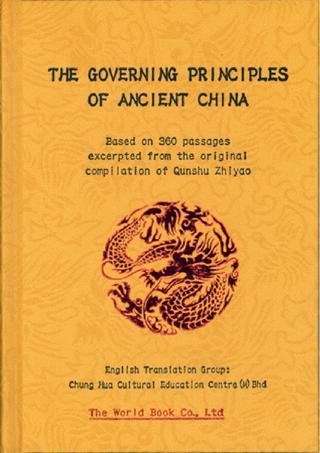
Source: Association of Master Chin Kung’s Friends at UNESCO
Origins of The Governing Principles of Ancient China
The Tang dynasty (618–907) is regarded as a high point in Chinese civilization, a golden age. Part of its success was due to following the guidelines outlined in Principles. The book was compiled at the decree of emperor Tang Taizong (598–649), the cofounder of the dynasty and one of China’s greatest emperors. The book’s purpose was to provide insight into how past emperors governed China successfully. Its contents came from Chinese classics like the Book of Odes (詩經), the Book of Changes (易經), and the Dao De Jing (道德經), histories, and philosophy. The emperor’s ministers were ordered to extract the most important passages related to the cultivation of oneself, managing a family, good government, and creating world peace. The final work was over 500,000 words long.

Emperor Tang Taizong. Source: Top Ancient History
Cultivating Virtue Starts with Guarding Against Greed
The video lecture series was given by professor Yuli Liu, a professor at the the Department of Philosophy at the Party School of the Communist Party of China and a visiting professor at other well-respected universities in China. She had also given a talk at the UNESCO peace conference I had attended, which I really enjoyed.
The first video I translated was entitled, Cultivating Virtue Starts with Guarding Against Greed (修善始於戒貪). Professor Liu began her lecture with the following enlightening story:
King Zhuang of Chu once asked the philosopher Zhan He, “How does one govern a country?” Zhan He said, “I only know how to cultivate myself, I still don’t know how to govern a country.” Zhan He went on to say, “I’ve never heard of a monarch who cultivated himself well, but whose country lacked order. And I’ve never heard of a ruler who didn’t cultivate himself, yet had a stable country. So, at the root of the root is self-cultivation of virtue. So for a secondary matter like governing a country, I don’t dare speak of it.”
Apparently, it was vitally important for a ruler to develop virtue and integrity. This made sense to me.
Professor Liu went on to say that at the root of cultivating virtue is overcoming material desires. Only when one is free from desire will they not be swayed by money, sex, fame, and profit, and will be able to control themselves. If all of a country’s leaders and officials could eliminate corruption and greed, then the country would be harmonious and peaceful.
The rulers at the end of the Xia (1728–1675 BC) and Shang (1600–1046 BC) dynasties, Jie and Zhou, were known for extreme debauchery. It is said that emperor Jie made an alcohol lake for his concubine Mo Xi. Due to the indulgence in extravagance, these rulers brought about the end of their respective dynasties. Clearly, they were not masters of their domain.
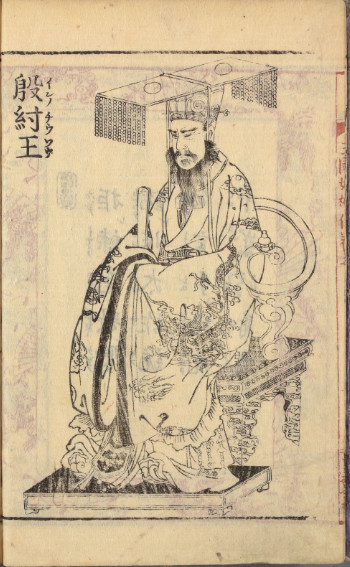
Emperor Zhou of Shang Dynasty. Source: Wikipedia
What I enjoyed most about the series was how pertinent the content is for today’s world. It is every bit as applicable today as it was 1,500 years ago.
Unfortunately, there were some copyright problems with the lecture series and translation halted after just three episodes. But it was enough to pique my interest.
Governing Principles of Ancient China 360
In 2011, Master Chin Kung came up with the idea to create a condensed version of Principles by extracting 360 passages from the original and translating them from classical Chinese into modern Chinese, English, and many other languages. The free English edition can be found here. Master Chin Kung has been promoting this book for the last several years at UNESCO and hopes that world leaders will be able to use its contents to help them in their work.
Below is a recent video containing the views of some UNESCO ambassadors on Principles 360.
Although the book is directed at leaders of a country, its contents can be applied by anyone. In a household, the parents are the leaders; in a company, the owners and managers are the leaders. Each of us is like the leader of his or her own life and the principles can be used by us too, no matter what our role is in society.
The book is divided into six sections: The Way of a Leader, The Art of a Minister, Esteeming Virtues, On the Subject of Administration, Respectfully Cautious, and Discerning.
The following is an overview of each section.
1. The Way of a Leader
Much of the advice contained in the section on being a leader is about self improvement and character building. Before a person can bring harmony to their work department, family, or classroom, they first needed to have their own house in order.
The passages from this section give many accounts of previous rulers who displayed outstanding character. A common theme is self-reflection, which at the extreme, manifests as taking the blame for the mistakes of others, as in the following example:
King Tang, who founded the Shang dynasty said, “If in my person as a king I have committed offenses, oh Lord of heaven, do not hold the people of the myriad regions responsible. If people in the myriad regions committed offenses, let the punishment fall on me alone, for I have not taught people the proper way to behave.”
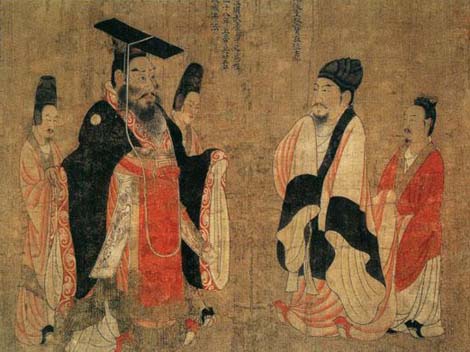
Source: Social Groups in China
There are also many passages in this section that talk about good moral standards and hard work as the roots of good government, while selfish desires are the cause of poor government or even the fall of a dynasty. A good ruler and leader keeps his desires in check. Another key towards developing the character necessary to be a leader is learning from one’s mistakes and shortcomings:
The most serious blunder we can make is in knowing we have failings and yet we refuse to correct them until such failings harm and cost our life.
Criticism of the emperor was welcome and critical for successful government:
The government of the ancient sage-kings had official historians who recorded the mistakes made by the ruler, and official musicians to sing ballads to remind the ruler of his mistakes. Ordinary folk could be heard making criticisms against the ruler on the roadside, and businessmen could be heard discussing the ruler’s faulty actions in the marketplace. Thus, sage rulers were able to hear about their mistakes and correct them, and to implement sensible policies that were just and honorable. These were factors that contributed to the longevity of their government.
I like the following passage because it emphasizes the benefits of treating others well.
When a lord treats his subordinates like brothers, they will pledge allegiance to him in return. When a lord treats his subordinates like slavish animals, they will regard him as a stranger on the street. When a lord treats his subordinates like dirt and weeds, they will regard him as a robber and an enemy.
Great attention was given to choosing the right ministers and to listening to their advice:
No country will enjoy everlasting peace and no common people will stay forever submissive. When the wise are recruited to serve in the government, the country will enjoy peace and prosperity. To lose them could mean an end to a government. From ancient times until today this recurring theme has not changed at all.

2. The Art of a Minister
It behooves a minister to uphold integrity:
Once upon a time, the great scholar and government minister, Yang Zhen, was promoted to become the prefect of Donglai prefecture. During his travel to Donglai via Changyi county, he was approached in the middle of the night by a man called Wang Mi, who had been nominated by Yang Zhen to become the magistrate of Changyi county. Wang Mi brought with him 10 kilograms of gold as a gift. Yang Zhen was appalled and upset at the sight of this gift. He said to Wang Mi: “As your old friend I understand you very well. But you don’t seem to understand this old friend of yours very well.” Wang Mi replied: “It is the dead of night. No one will know you received the gold!” Yang Zhen corrected his friend: “Heaven knows, the deities know, I know and you know. How can you say nobody knows?”
A minister should be loyal to his/her ruler and speak the truth. He/she should not be afraid of offending his/her superior. It is also important for ministers to nominate the right administrators:
Confucius asked his student, Zigong: “…Who do you think is wiser—the one working hard for himself, or the one nominating worthy officials to the government?” To this Zigong answered: “The one nominating worthy officials to the government is wiser.” Confucius said: “You are right.”
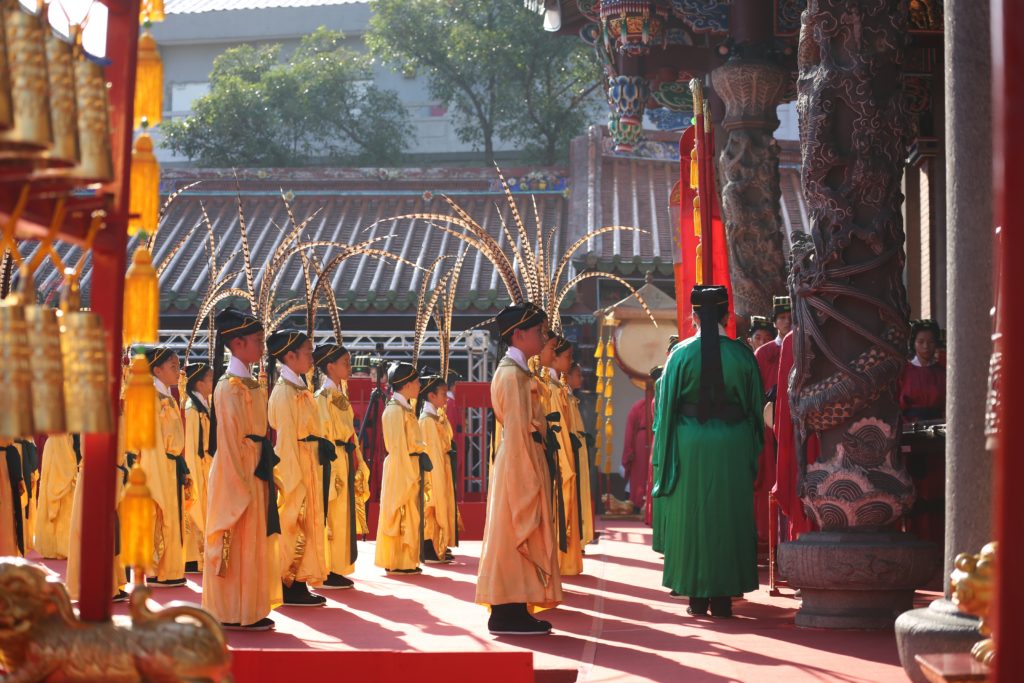
A ceremony paying respect to Confucius, who is revered as the best teacher in China’s long history.
3. Esteeming Virtues
The virtues revered by the ancient Chinese included humility, perseverance, righteousness, sincerity, trustworthiness, respect for the Dao (Way), filial piety, kinship, being discreet, righting one’s errors, friendship, generosity, and continuous learning.
According to the Doctrine of the Mean, “Dao is the right way of behavior following one’s nature.” The Dao De Jing says, “Man takes his law from the earth, earth takes its law from Heaven, Heaven follows Dao, and Dao follows nature.” So, in my understanding, Dao is like following one’s true nature or highest self. With regard to Dao, one may model the sages, whose bread and butter is Dao:
Sages do not accumulate things. In their giving of themselves to others, they receive more in return. The way of Heaven is to benefit and not harm. The way of the sage is benefitting others while never competing.
Filial piety is similar to the Fourth Commandment, honoring and respecting parents. In the lectures from Master Chin Kung, he constantly talks about the importance of filial piety, probably more than anything else. A person can’t be a true Buddhist practitioner if they haven’t learned the basics of what it means to be a human being.
In Chinese culture, filial piety is considered number one of all the virtues, because all others arise from it. Being good to parents is just the superficial definition of filial piety. A broader definition is leading a good and successful life. Below is one passage in Principles about filial piety, which comes from a 4th century BC Confucian classic, the Classic of Filial Piety:
Our bodies, to every hair and every bit of skin, are given to us by our parents, and we must not presume to injure or wound them. This is the beginning of filial piety. When we have established a virtuous character by the practice of the filial course, so as to make our name revered in future ages and thereby glorify our parents, this is the ultimate goal of filial piety. It commences with the service of the ruler; it ends with the establishment of a virtuous character.
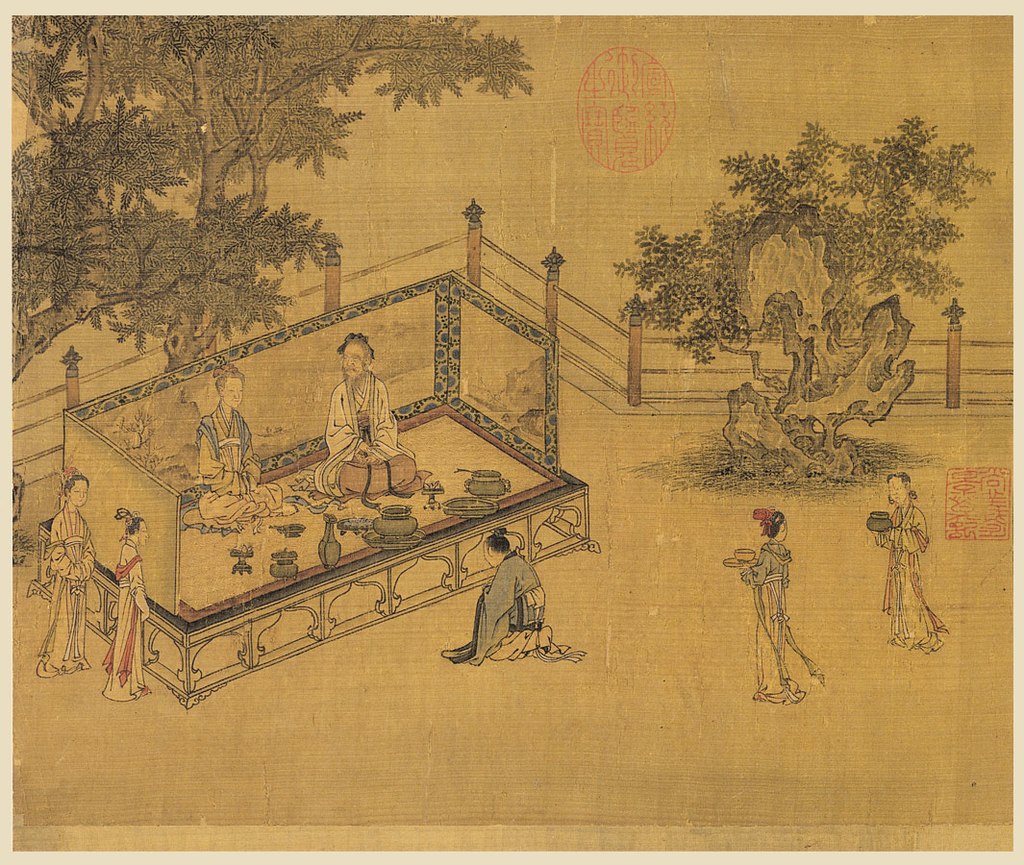
Scene from Illustrations of the Classic of Filial Piety. Source: Wikipedia
Whatever the leader does, the subordinates will do it too, so it is important to be honest, fair, and frugal instead of dishonest, unfair, and spending lavishly. There is one passage from this section I especially like:
There are three protocols for generals and commanders of an army: Do not wear fur coats in the winter; do not use fans in the summer; do not open umbrellas on rainy days.
The purpose of doing this was to remind generals and commanders to place themselves in the shoes of their soldiers. By doing this, a commander could empathize with the conditions of the soldiers, gain their loyalty, and ultimately win in battle.
There are thirteen passages in Principles 360 dedicated to humility. This is because humility brings benefits whereas pride leads to loss. It is said in one passage that “It is the way of Heaven to diminish the full and augment the humble.”
In the Dao De Jing gives the following simile about humility:
The reason why rivers and seas are able to receive the homage and tribute of all the valley streams is that they are lower than all the others. It is thus that they are the kings of them all.
In the Daoist divination system of yin and yang, there are eight symbols, or trigrams, that represent fundamental principles of reality. Only the symbol for humility, qian, foretells purely auspiciousness, where as the others foretell a mix of good and bad luck.
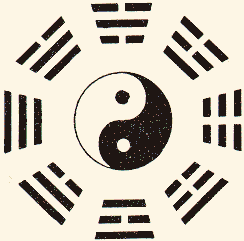
Yin and yang symbol surrounded by the eight trigrams. Source: Gothenborg.com
Modern day self-help gurus tout that we are the average of the five people we associate most with. The ancient Chinese also believed something similar. Confucius said:
There are three kinds of friendship which are beneficial and three kinds of friendship which are harmful. Being friends with people who are fair-minded, sincere, and knowledgeable are beneficial. Being friends with people who are deceptive, unprincipled, and smooth talking, are harmful.
In Chinese there is even the phrase “wine-and-meat-friends” (酒肉朋友), which means drinking buddies or fair-weather friends. These are the people you have no deep connection with but just go out with to have drinks or to eat.
Confucius placed lots of emphasis on continual learning. Even today, Chinese people are known for their enthusiasm and drive towards higher education. Confucius said:
I have tried to spend a whole day without eating and a whole night without sleeping in order to meditate but I got nothing out of it. I might just as well study the classics written by the sages.
Another passage in Principles 360 says:
Never tire of learning for it will subdue our bad habits; never tire of teaching for it will educate and transform people.
The monks I met at Hwadzan have morning and evening classes everyday. They wake up in the wee early hours of the morning to learn the wisdom of the ancients. Master Chin Kung and other teachers of traditional Chinese culture place a ton of importance on continuous learning. There is even a common phrase in Chinese that goes, “Keep on learning as long as you live” (活到老,學到老).
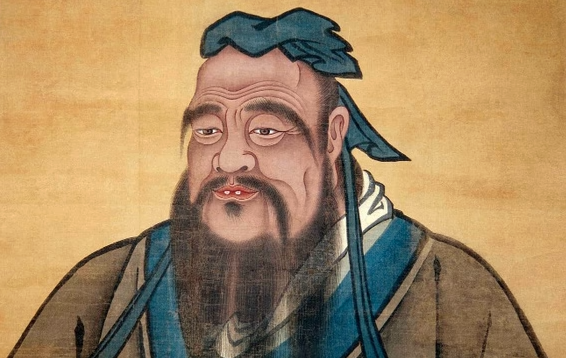
Confucius. Source: Wikimedia Commons
4. On the Subject of Administration
Principles 360 has a lot to say on the topic of administration. A great deal of this section is about our relationships with each other. Only when individual relationships are nurtured can there be good government and a harmonious society.
Many of the passages in this section talk about how those individuals who are filial, virtuous, and able make the best administrators within the government:
Confucius said, “The filial piety with which a man serves his parents may be transferred as loyalty to the ruler.” Thus, in order to find a loyal subordinate one only needs to look from families with filial children.
When leaders in government focus on the fundamentals, then the government and nation will prosper. Principles 360 says, “People constitute the foundation of a nation. When the foundation is stable, the nation will become peaceful and harmonious.”
Education played a very important role in government. Principles 360 offers this definition of education:
Whatever people in higher positions do will set an example for those beneath to follow.
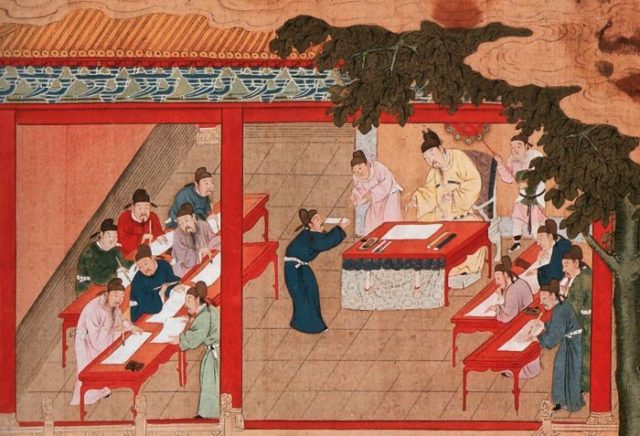
Palace Examination at Kaifeng, Song Dynasty, China. Source: Chinasage
Interestingly, music played a very important role in government in ancient China:
During times of peace and prosperity, the music played is serene and joyful because the political situation has been tolerant and harmonious. On the other hand, music played in tumultuous times is filled with anger because the government has violated the law of nature and the common aspiration of the people. When a country perishes, the music played is sorrowful and melancholic because people have been left in desolation.
Music comes from the heart, and propriety sets a standard for a person’s outward behavior. Grand music must be amiable and grand ceremonies must be simple and modest.
Great importance was placed on the leader caring about his or her people:
When a ruler loves his people as if they are his children, and all the people love him as if he is their father, the ruler can then be deemed as the Son of Heaven in its truest sense.
The heaven and the earth nourish all things and enable them to prosper and flourish. The sages take good care of the virtuous so that the latter can serve the society and bring happiness to all people.
[Good leaders] grieve for people who are starving and mourn for people who are toiling in hardship.

5. Respectfully Cautious
It was important to stay cautious because doing so would bring benefits; making mistakes was believed to be the cause of misfortune:
A family that accumulates many good deeds will bring wealth and blessings to its descendants. A family that accumulates many bad deeds will bring calamities to its descendants.
Confucius said:
If a man takes no thought about what is distant, he will find sorrow near at hand.
Lao Tzu said:
A sage anticipates things that are difficult while they are easy, and does things that would become great while they are small. All difficult things in the world are sure to arise from a previous state in which they were easy, and all great things from one in which they were small. Therefore the sage, while he never does what is great, is able on that account to accomplish the greatest things.
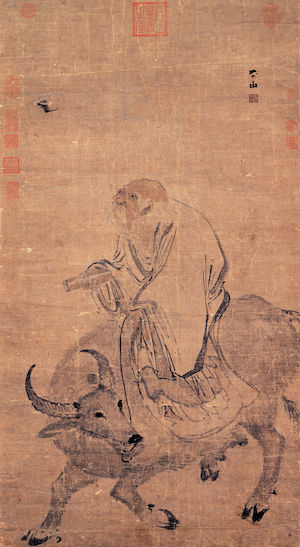
Lao Tzu riding an ox. Source: Wikipedia
Many passages describe signs that a government and country are in disarray:
If everyone is fighting for their own interest, the country will be in danger.
Valuable human resources are used on useless projects and unworthy people are rewarded.
Trusted ministers betray the ruler’s trust while loyal ministers are case aside.
To be greedy, opinionated, and rejoice in nothing but gain, which sows the root of destruction for the state and oneself.
A leader who has caused the downfall of his state must have been arrogant. He must have perceived himself to be clever and too important to waste his time on matters of administration.
Correct response to events typically included things like making a plan, talking little, and taking more action:
A superior person is knowledgeable but he is humble. He says little but he puts principles into practice. He takes actions but allows others to do the talking.
Success depends upon preparation in advance. Without such preparation there will be failure. Know what to say in advance and you will not be stuck for words. Know what to do in advance and you will not be trapped in difficulties. Take actions after a plan has been carefully laid out and you will not make regrettable mistakes.
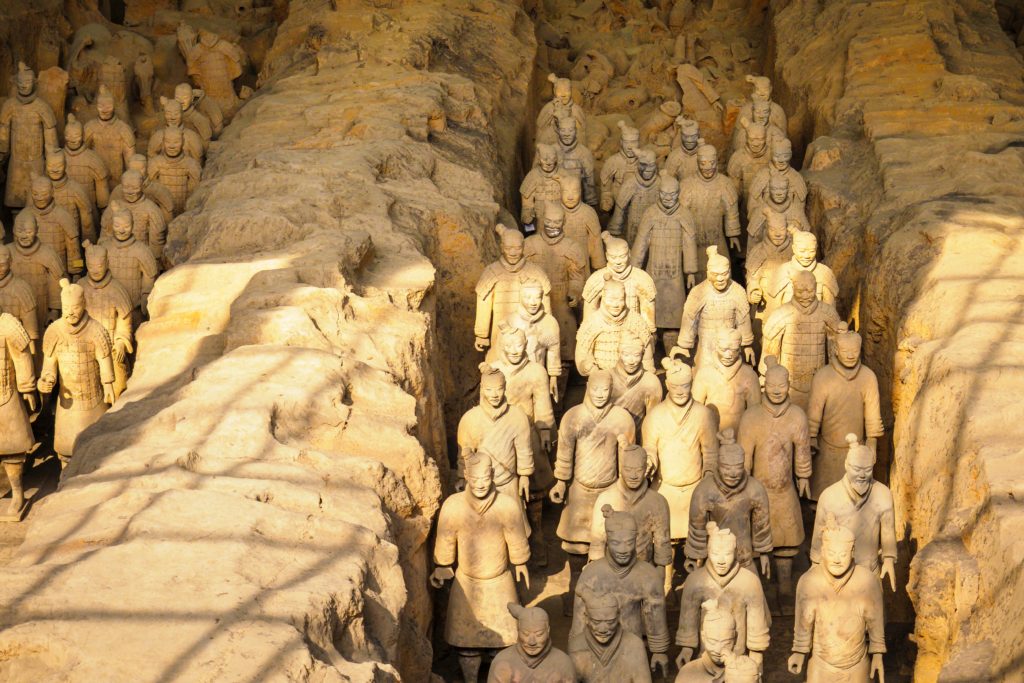
Terra cotta soldiers buried with Qin Shi Huang, the first emperor of unified China.
6. Discerning
Good leaders could distinguish between good and evil:
A superior person perfects what is good in people. He does not perfect what is bad. A petty person does the opposite.
A superior person conceals the faults of others as a means to cultivate his own kindness. A petty person destroys the kind deeds of others as a means to show off his own greatness.
Naturally, it was important that leaders be discerning:
If you do not understand the son, just look at his friends and you will find the answer. If you do not understand the leader, just look at the ministers by his side and you will find the answer.
The law of cause and effect is mentioned a lot in traditional Chinese culture writings. This is the law that says arises from causes; good causes give rise to good results and bad causes give rise to bad results. There is so much to say on this topic that it necessitates its own post. Here I will just list a few quotes about it:
Life or death, fortune or misfortune, are all but the result of our own doings. When people accumulate a multitude of meritorious deeds, no natural catastrophe will befall them.
Natural disasters can be averted as long as people are willing to abandon their devious ways and do more good instead. But if they continue to commit bad deeds without remorse, they will never be able to escape the onslaught of misfortunes.
In the way of heaven, there is no partiality of love; it is always on the side of the good man.
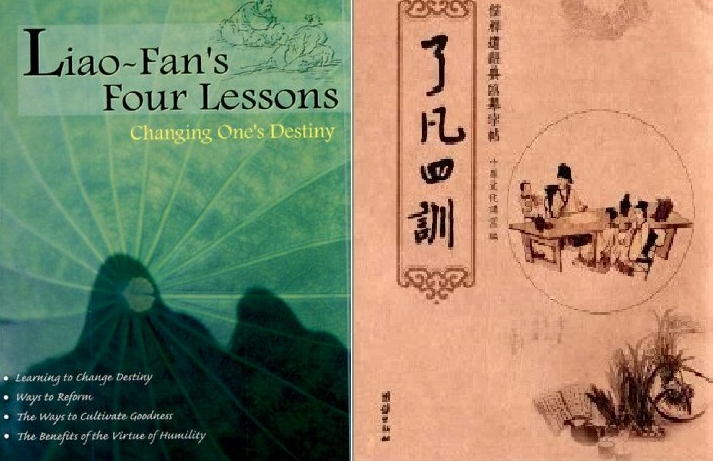
Liao Fan’s Four Lessons is a book dedicated to the law of cause and effect. Source: Internet Archive
Final Thoughts on the Principles
I find it very refreshing that the ancients had already come up with effective principles for how to conduct one’s life that are as applicable today as they were 2,000 years ago. That such a long time has passed, and still the principles are relevant, are a testament to their wisdom. I hope that world leader’s can learn to implement these principles in their administrations.
The intention of this post is to give an overview of the Governing Principles of Ancient China. I think that most of what is written is relevant today, and society could benefit a lot from acting with some of these principles in mind.
For those who know Chinese and want to learn Principles 360 through audio, there is a nice video series of all 360 passages by Venerable Wu Dao on YouTube below.